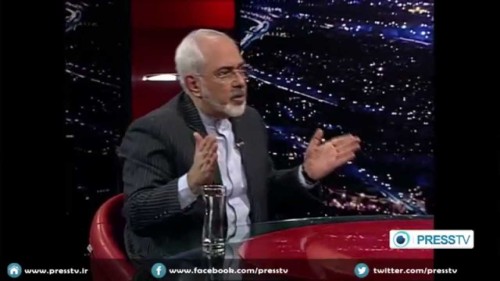UPDATE 1715 GMT: Meeting Foreign Minister Mohammad Javad Zarif (pictured) on Sunday, Iranian MPs have insisted on the immediate termination of all sanctions against Tehran in a comprehensive nuclear deal.
Mohammad Hassan Asafari, a senior member of Parliament’s National Security Commission, said, “The immediate annulment of sanctions, safeguarding the nuclear rights and continued Research and Development activities in the nuclear field were among the issues emphasized by the MPs.”
The legislators also demanded that the Foreign Minister “help the opposite side understand that Iran has not sat to the negotiating table due to the pressures and sanctions”, proclaiming the vast increase of both centrifuges in use and advanced centrifuges that can be put on-line.
Kazem Jalali, head of Parliament’s Research Center, derided the US fact sheet about the nuclear framework as a sign of Western dishonesty:
We should be concerned about the attitude of the westerners because the wall of mistrust has grown so tall inside Iran….[Agreements] show the other side has not fulfilled its commitments….
We should pay due attention to the fact that the document [the Iran-5+1 Powers announcement of the framework] should not be valued as to be anything more than a statement.
Some Iranian State media ignore the Parliamentary statement. Instead, Press TV highlights President Rouhani’s declaration after a meeting with senior Iranian officials, “We have never negotiated the suspension of sanctions and if it were the case, there would be no agreement.”
He continued, “The world knows that there is no way but to [reach] agreement and understanding with Iran because the great, courageous and resistant Iranian people have stood by their ideals despite hardships…[and will never] yield to pressure and sanctions.”
UPDATE 1430 GMT: The head of Iran’s armed forces, General Hassan Firouzabadi, has given his support to Iranian negotiators and the nuclear framework reached with the 5+1 Powers.
Firouzabadi congratulated the Supreme Leader on the “success of the team of Iranian negotiators and thanked the President” and the officials led by Foreign Minister Mohammad Javad Zarif.
The Supreme Leader still has not reacted publicly to the framework, but Friday Prayers throughout Iran were also supportive of the negotiators.
In a televised interview of more than two hours on Saturday, Foreign Minister Mohammad Javad Zarif has appealed to Iranians to support a nuclear deal with the 5+1 Powers.
Amid detailed questions about the terms of the nuclear framework, declared last Thursday between Iran and the 5+1 (US, Britain, France, Germany, China, and Russia), Zarif said, “We defend our people’s rights, but the talks are tough. Please give us three months to negotiate.”
Reached after months of intensive negotiations, the framework sets out limits on Iran’s nuclear centrifuges and facilities, moves almost all of Tehran’s enriched uranium out of the country or dilutes it, and mandates extensive inspections. The two sides will now discuss implementation of the terms, hoping for a comprehensive resolution by a June 30 deadline.
Needing to minimize the scale of Iranian concessions — given to avoid an economic crisis, caused in part by US-led sanctions — Zarif portrayed Tehran’s resolve: “They wanted to get Iran to submit — [that was the] point of sanctions. I am proud of the Iranian nation, they showed Iran wouldn’t submit.”
Much of the conversation turned on a public rift between Iran and the US after the announcement of the framework. Iranian officials, including Zarif, had accused the Americans of “spinning” the agreed points with a fact sheet setting out the terms and Iran’s concessions. In particular, Tehran claimed Washington was lying with the presentation of a “gradual” removal of US, European Union, and UN sanctions — Zarif and others insisted that the restrictions would be “immediately” lifted upon a comprehensive deal.
However, last night the Foreign Minister effectively admitted that the US language — sanctions will be lifted when the “International Atomic Energy Agency verifies Iranian compliance”, but can be re-imposed if Iran is found in violation of the agreement — is correct:
On the Day One when the IAEA confirms that Iran has implemented its obligations in a deal, the US would have to lift all sanctions.
Zarif said that US State Department spokeswoman Marie Harf’s estimate of “six months” for the process was far too cautious — instead, IAEA clearance and the removal of sanctions could come within “six weeks”.
That message, however, appears to be lost on Iranian State media this morning. Press TV omits the Foreign Minister’s proviso about IAEA verification to headline, “Zarif: UNSC [UN Security Council] to Kill Anti-Iran Resolutions Upon Final Deal”.
Fars News, the outlet of the Revolutionary Guards, ignores Zarif’s interview on its English-language site. Instead, it continues to feature Deputy Foreign Minister Abbas Araqchi’s denunciation of the State Department comments as a “wrong interpretation”.
Fars’ Persian-language site has a full report of Zarif’s remarks, but also omits the statement about IAEA verification.
State news agency IRNA’s English outlet also makes no reference to the proviso and appears to have buried the interview on its Persian-language site.

